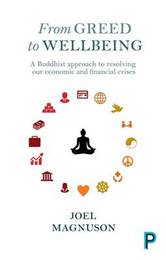
|
From Greed to Wellbeing: A Buddhist Approach to Resolving Our Economic and Financial Crises
Paperback / softback
Main Details
| Title |
From Greed to Wellbeing: A Buddhist Approach to Resolving Our Economic and Financial Crises
|
| Authors and Contributors |
By (author) Joel Magnuson
|
| Physical Properties |
| Format:Paperback / softback | | Pages:256 | | Dimensions(mm): Height 216,Width 138 |
|
| Category/Genre | Economic theory and philosophy |
|---|
| ISBN/Barcode |
9781447318941
|
| Classifications | Dewey:330.01 |
|---|
| Audience | | Professional & Vocational | |
|---|
| Illustrations |
No
|
|
Publishing Details |
| Publisher |
Bristol University Press
|
| Imprint |
Policy Press
|
| Publication Date |
16 November 2016 |
| Publication Country |
United Kingdom
|
Description
Despite fitful attempts over decades at reform, the global financial system seems to be caught in continuous cycles of boom and bust, instability and scandal. In this timely new book, Joel Magnuson builds on the classic works of E F Schumacher and other kindred spirits, to provide a Buddhist economics perspective on this recurring pattern, and offers new possibilities for real change.
Author Biography
JOEL MAGNUSON, Ph.D. is an independent economist based in Portland, Oregon, USA. He is the author of Mindful Economics: How the U.S. Economy Works, Why it Matters, and How It Could Be Different and The Approaching Great Transformation: Toward a Livable Post-Carbon Economy, as well numerous articles in journals and anthologies in the US, Europe, and Japan.
Reviews"This is an insightful critique of our dysfunctional economic system, informed by Buddhist principles. Magnuson shows that the reforms usually proposed cannot alleviate the basic problem: a system that is self-destructive because it institutionalizes greed. And he offers a way forward implied by Buddhist teachings." David Loy, author of The Great Awakening: A Buddhist Social Theory "a creative approach to understanding our world and will motivate and inspire you as a Buddhist, citizen, and human being." - Tricycle "Magnuson presents an ethical critique of conventional economics based in Buddhist principles, offering a hopeful and creative path to system stability, personal satisfaction, and liberating transformation." Stephanie Kaza, Professor emerita, University of Vermont "From Greed to Wellbeing is a tour de force. If you really want to get a close look at the socioeconomic merry-go-round we've been on since 1776 (and before), this is the book for you." Review by Morris Berman on Amazon.com "Joel Magnuson skillfully applies Buddhist teachings to quench the flames of greed, hatred, and delusion that are consuming our world." Christopher Queen, Harvard University, Editor of Engaged Buddhism in the West. "Institutionalist economist, Joel Magnuson, is a man with passion, a man on a mission. He offers a stinging critique of hegemonic capitalistic practices, especially of the vagaries of the banking and financial sectors, and the reductionist calculations of the official GDP, and proposes remedies based in socially engaged Buddhism to help us avoid the cyclical crises that plague this sector and the entire social body. He skillfully analyzes how the three fires long recognized by the Buddha-greed, aggression and delusion-fuel all manners of "fads, bubbles, and panics" in our individual and collective behavior. Magnuson shows from various angles and with a wealth of examples how defiled perceptions of self and reality feed economic toxicity and general suffering. He is at his inspired best when he details how our "witless attachment to mental fiction" plays itself out through social institutions such as money, credit, or formal institutions such as the Feds. He carefully demonstrates the sad straight line running from individual "craving and covetousness" to collective celebration of greed (the reification of ignorance) to institutionalization of greed by social structures, and finally to the cynical protection of greed and banksters (moral hazard) by political actors and governmental agencies. To remedy such dire situations, he calls for wholesomeness at the individual level, for locally-owned community banks, for holistic accounting aggregates to measure human happiness, and for what may be broadly termed social responsibility and an ethical economy. Since self and society are inseparable parts of the same complex whole, Prof. Magnuson reminds us to both meditate and chop wood and carry water in the conditions of our age. Indeed, the practice of the dharma is by essence connected to our social selves and our mission in society, and asks us to address both individual and collective, both gross and subtle dukkhas. His is a prudently optimistic perspective, as he draws on many examples of socially-engaged Buddhism, such as Bernie Glassman's Greyston Bakery or Thich Nhat Hanh's Order of Interbeing, to get us out of "our state of somnambulant apathy" and toward a better society. Magnuson proposes a commendable yet difficult journey toward personal enlightenment, a more humane economy, and a better future." Michel Gueldry, PhD, Professor, International Relations and Sustainability Studies, Middlebury Institute of International Studies, California "Restructuring individual consciousness and restructuring society are complementary activities, and both are desperately needed. This new book from Joel Magnuson shows us how to do this." Sulak Sivaraksa, author and founder/chair of International Network of Engaged Buddhists
|